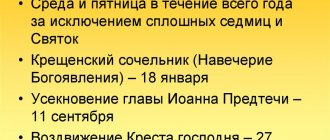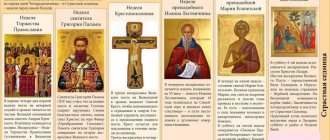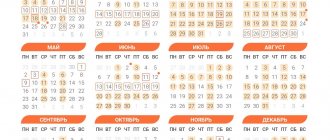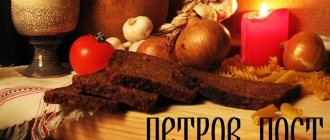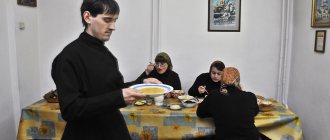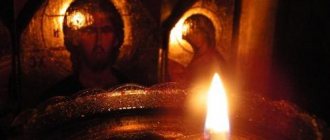| Period | Mon | W | Wed | Thu | Fri | Sat | Sun |
| Lent | without oil* | without oil* | xerophagy | no oil | xerophagy | With butter | With butter |
| Spring meat eater | fast | fast | |||||
| Apostolic post | fish | fish | With butter | fish | With butter | fish | fish |
| Summer meat eater | fast | fast | |||||
| Uspensky village : August 14-27 | without oil* | without oil* | xerophagy | no oil | xerophagy | With butter | With butter |
| Autumn meat eater | fast | fast | |||||
| Christmas post : 28 Nov. – Jan 6 | |||||||
| Nov 28–Dec 19 | fish | fish | With butter | fish | With butter | fish | fish |
| 20 Dec.–1 Jan. | With butter | With butter | without oil* | With butter | without oil* | fish | fish |
| Jan 2–6 | without oil* | without oil* | xerophagy | no oil | xerophagy | With butter | With butter |
| Winter meat eater | fast | fast | |||||
Dates are indicated according to the new style.
* This means that olives are used instead of vegetable oil.
The Charter fully applies to the monastic practice of Palestine (see “Fast according to the Typikon”). This table reflects current parish practice, which may vary depending on local traditions. The laity determine their norm individually, preferably with the blessing of the priest.
***
In the Russian Orthodox Church there are four multi-day fasts, fasts on Wednesday and Friday throughout the year (with the exception of five weeks, called continuous), and three one-day fasts.
Lent
The Savior Himself was led by the Spirit into the desert, was tempted by the devil for forty days and did not eat anything during these days. Great Lent is a fast in honor of the Savior Himself, and the last passionate week of this 48-day fast is established in remembrance of the last days of earthly life, the suffering and death of Jesus Christ.
Fasting is observed with particular strictness during the first, fourth (Worship of the Cross) and Holy weeks.
On the first two days of Lent, as well as on Good Friday, the Typikon orders (monks) to completely abstain from food. The rest of the time: Wednesday, Friday – dry food (water, bread, fruits, vegetables, compotes); Tuesday, Thursday – hot food without oil; Saturday, Sunday – food with vegetable oil.
Fish is allowed on the Annunciation of the Blessed Virgin Mary and on Palm Sunday. Fish caviar is allowed on Lazarus Saturday. On Good Friday there is a tradition of not eating food until the shroud is taken out (usually this service ends at 15-16 hours).
Scripture on Fasting
In the Holy Scriptures there is a development of understanding of fasting. At a time when the concept of personal spiritual achievement in society had not yet been fully formed, fasting was a nationwide or public act of repentance, a period of preparation for important events in the life of a people or society.
Those who fasted through a penitential fast mourned their sins , sincerely prayed to God for forgiveness, and testified by their appearance and behavior that their hearts were filled with sadness for what they had done. Indeed, a person who is truly upset about something loses his appetite and the desire to enjoy food.
Those who wanted to receive God's answer to their requests and prayers fasted to testify to their intention to be heard by the Lord . Everything else (including issues of nutrition and everyday life) was relegated far into the background. Indeed, a person awaiting an important decision for him is concentrated, tense and in no hurry to take care of the usual concerns about food and comfort.
The people of Israel practiced common fixed fasts, which were evidence that people remembered the covenant with the Lord. Fasts were also announced on the occasion of important events for the people. Since ancient times, individual people have fasted as a sign of repentance or so that the Lord would reveal his will to them.
The first thing a person who wants to fast correctly pays attention to is food restriction. Someone who strictly fasts completely abstains from food for a certain period. The fasting person does not strictly simply abstain from certain types of food (food of animal origin, boiled food, etc.). However, already in the Old Testament prophets we encounter a non-gastronomic side of fasting.
The prophet Isaiah conveys the words of the Lord that what pleases Him is not so much the torment of the stomach and outward displays of sadness, but rather the active mercy of the fasting person.
Feed the hungry, clothe the naked, give shelter to the homeless, protect the offended - then you will be heard by the Lord, and your fast will be pleasing to Him.
Apostolic post
The beginning of Apostolic Lent always falls on the second Monday after Trinity Day. Lent always ends on July 12 - before the feast of the apostles Peter and Paul. The duration of fasting depends on the date of Easter (from 8 to 42 days).
This fast was established in honor of the Holy Apostles, who, through fasting and prayer, prepared for the worldwide preaching of the Gospel and prepared their successors in the work of saving service.
On Wednesday and Friday, hot food with butter. On other days - fish, mushrooms, cereals with vegetable oil.
Orthodox fasts in 2022
Orthodox calendar of fasts and meals for 2022 with an indication and brief description of multi-day and one-day fasts and continuous weeks.
Fasting is not in the belly, but in the spirit. Popular proverb
N
Nothing in life comes without difficulty.
And in order to celebrate the holiday, you need to prepare for it. In the Russian Orthodox Church there are four multi-day fasts, fasting on Wednesday and Friday throughout the year (except for a few weeks), and three one-day fasts. Great Lent · Peter's Fast · Dormition Fast · Nativity Fast Continuous weeks · Wednesday and Friday fasts · One-day fasts
ATTENTION! Below you will find information about dry eating, food without oil and days of complete abstinence from food. All this is a long-standing monastic tradition, which even in monasteries cannot always be observed in our time. Such strictness of fasting is not for the laity, and the usual practice is abstaining from eggs, dairy and meat foods during fasting and during strict fasting also abstaining from fish. For all possible questions and about your individual measure of fasting, you need to consult your confessor.
Dates are indicated according to the new style
Calendar of fasts and meals for 2022
| Periods | Monday | Tuesday | Wednesday | Thursday | Friday | Saturday | Sunday | |
| Great Lent from March 7 to April 23 | xerophagy | hot without oil | xerophagy | hot without oil | xerophagy | hot with butter | hot with butter | |
| Spring meat eater | fish | fish | ||||||
| Petrov fast from June 20 to July 11 | hot without oil | fish | xerophagy | fish | xerophagy | fish | fish | |
| Summer meat eater | xerophagy | xerophagy | ||||||
| Dormition Fast from August 14 to August 27 | xerophagy | hot without oil | xerophagy | hot without oil | xerophagy | hot with butter | hot with butter | |
| Autumn meat eater | xerophagy | xerophagy | ||||||
| Nativity Fast from November 28 to January 6 | until December 19 | hot without oil | fish | xerophagy | fish | xerophagy | fish | fish |
| December 20 - January 1 | hot without oil | hot with butter | xerophagy | hot with butter | xerophagy | fish | fish | |
| January 2-6 | xerophagy | hot without oil | xerophagy | hot without oil | xerophagy | hot with butter | hot with butter | |
| Winter meat eater | fish | fish | ||||||
Dormition Fast August 14 – August 27
A month after the Apostolic Fast, the multi-day Dormition Fast begins. It lasts two weeks - from August 14 to 27. With this fast, the Church calls us to imitate the Mother of God, who, before her resettlement to heaven, constantly remained in fasting and prayer.
Wednesday, Friday – dry eating. Monday, Tuesday, Thursday - hot food without oil. On Saturday and Sunday, food with vegetable oil is allowed.
On the day of the Feast of the Transfiguration of the Lord (August 19), fish is allowed.
If the feast of the Dormition of the Blessed Virgin Mary falls on Wednesday or Friday, then the charter allows fish.
Fasting as a means of spiritual work
Fasting has an important ascetic component. Ascetics always pointed to bodily abstinence as a means of combating the passion of gluttony. The main meaning of a person’s life should not be reduced to the desire to eat tasty, a lot and often.
Christian ascetics point out a direct connection between gluttony and lust.
It has also been noticed that a person who fasts wisely prays more concentratedly and maintains a “well-being of the mind.” Physical fasting is a means to overcome verbosity and idle talk.
The unification is called St. John Climacus, the head of all bodily passions.
Hardness of heart, drowsiness, laziness, verbosity, insolence, insolence, insensibility, blasphemy, insolence, unexpected misadventures and despair. The well-known spiritual mentor of monastics sees all this as the consequences of bodily intemperance.
St. John Climacus emphasizes the benefits of bodily fasting. It extinguishes bodily liquefaction, destroys insensitivity of the heart, and is the beginning of humility and health of the body.
Nativity Fast November 28 – January 6
At the end of autumn, 40 days before the great feast of the Nativity of Christ, the Church calls us to winter fasting.
This fast was established so that we can adequately prepare for the grace-filled union with the born Savior.
If the feast of the Entry into the Temple of the Blessed Virgin Mary (December 4) falls on Wednesday or Friday, then fish is allowed by the charter.
On Christmas Eve, it is not customary to eat food until the appearance of the first star, after which they eat juice - grains of wheat boiled in honey or boiled rice with raisins (the symbol of the first star is a lit candle, which is taken out at the end of the Liturgy celebrated on the Eve of the Nativity of Christ, and before which it is sung Troparion and Kontakion of the Feast of the Nativity of Christ).
March
<<
| ||||||||
| Mon | W | Wed | Thu | Fri | Sat | Sun | ||
March begins with the pre-cleansing cheese-empty week. Orthodox Christians are beginning to prepare themselves for Lent. From March 1 to March 6, you should refrain from eating meat.
Lent
Lent begins on March 7th. Throughout the remaining days of the month, Orthodox Christians must adhere to strict fasting rules—for the laity, no animal products.
March 19 and 26 are Saturdays of remembrance of the dead.
For those leading their post according to strict rules (6 degrees):
- March 7, the first day of Lent - complete abstinence from food.
- Dry eating - March 8-11, 14, 16, 18, 21, 23, 25, 28 and 30.
- On Tuesdays and Thursdays, March 15, 17, 22, 24, 29, 31, it is allowed to eat heated dishes, but without oil.
- Saturdays and Sundays March 12, 13, 19, 20, 26, 27 you can add oil.
Solid weeks
A week is a week from Monday to Sunday. These days there is no fasting on Wednesday and Friday.
There are five continuous weeks:
Christmas time - from January 7 to January 18 ,
The Publican and the Pharisee - 2 weeks before Great Lent,
Cheese (Maslenitsa ) – the week before Lent (no meat),
Easter (Light) – week after Easter,
Trinity - the week after Trinity.
Meat eaters
Winter meat eater
⚅ January 7 – March 1, 2020
The period between Christmas and Great Lent. In 2022, it begins on January 7 and ends on March 1 (Forgiveness Sunday). During the winter meat-eating period, there is no fasting on Monday, Tuesday, Thursday, Saturday and Sunday. These days you can eat meat food. Fish is allowed on Wednesday and Friday.
Spring meat eater
⚅ April 19 – June 14, 2020
The period between Lent and Lent of Peter the Great. In 2022, it starts on April 19 and ends on June 14. During the spring meat-eating period, there is no fasting on Monday, Tuesday, Thursday, Saturday and Sunday. On these days you are allowed to eat meat. On Wednesday and Friday you can eat fish.
Summer meat eater
⚅ July 12 – August 13, 2020
The period between Petrov and Assumption fasts. In 2022, it starts on July 12 and ends on August 13. During the summer meat-eating period there is no fasting on Monday, Tuesday, Thursday, Saturday and Sunday. You can eat meat these days. Dry eating is prescribed for Wednesday and Friday.
Autumn meat eater
⚅ August 28 – November 27, 2020
The period between the Assumption and Nativity fasts. In 2022, it starts on August 28 and ends on November 27. During the autumn meat-eating period, there is no fasting on Monday, Tuesday, Thursday, Saturday and Sunday. On these days it is allowed to eat meat. On Wednesday and Friday it is prescribed to eat dry food.
One-day posts
Epiphany Christmas Eve - January 18 , on the eve of the Epiphany. On this day, Christians prepare for cleansing and consecration with holy water on the feast of Epiphany.
The beheading of John the Baptist - September 11 . This is the day of remembrance and death of the great prophet John.
Exaltation of the Holy Cross - September 27 . The memory of the Savior's suffering on the cross for the salvation of the human race. This day is spent in prayer, fasting, and contrition for sins.
One-day fasts are days of strict fasting (except Wednesday and Friday). Fish is prohibited, but food with vegetable oil is allowed.
February
<<
| ||||||||
| Mon | W | Wed | Thu | Fri | Sat | Sun | ||
In February, fast days will be Wednesdays - 2, 9, 23 and Fridays - 4, 11, 25. On the last day of February, the pre-cleansing week begins. Starting from this day, you should refrain from eating meat.
February 15, 2022 - Meeting of Our Lord Jesus Christ.
About meals on holidays
According to the Church Charter, there is no fasting on the holidays of the Nativity of Christ and Epiphany, which happened on Wednesday and Friday.
On Christmas and Epiphany Eves and on the holidays of the Exaltation of the Cross of the Lord and the Beheading of John the Baptist, food with vegetable oil is allowed.
On the feasts of the Presentation, Transfiguration of the Lord, Dormition, Nativity and Intercession of the Most Holy Theotokos, Her Entry into the Temple, the Nativity of John the Baptist, the Apostles Peter and Paul, John the Theologian, which occurred on Wednesday and Friday, as well as in the period from Easter to Trinity on Wednesday and Friday Fish allowed.
We recommend: Lenten recipes.
Fasting on Wednesday and Friday
Weekly fast days are Wednesday and Friday. On Wednesday, fasting was established in memory of the betrayal of Christ by Judas, on Friday - in memory of the suffering on the cross and death of the Savior. On these days of the week, the Holy Church prohibits the consumption of meat and dairy foods, and during the week of All Saints before the Nativity of Christ, one should also abstain from fish and vegetable oil. Only when the days of celebrated saints fall on Wednesday and Friday is vegetable oil allowed, and on the biggest holidays, such as Intercession, fish. Those who are sick and engaged in hard work are allowed some relief, so that Christians have the strength to pray and do the necessary work, but eating fish on the wrong days, and especially the full permission of fasting, is rejected by the rules.
